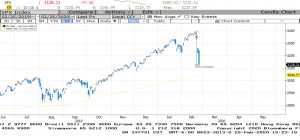Daily Comment (February 26, 2020)
by Bill O’Grady, Thomas Wash, and Patrick Fearon-Hernandez, CFA
[Posted: 9:30 AM EST]
Global equity markets continue under pressure this morning, despite rumors that some Asian “national teams” are trying to support the market. U.S. equity futures are trying to stabilize. We update the COVID-19 news, along with an update on Brexit. Here are the details:
COVID-19: The number of reported cases is now 81,191 with 2,768 fatalities. South Korea now has 1,261 confirmed cases and Italy is up to 322. Iran has 139, including its deputy health minister. The U.S. has 57. Brazil is likely to confirm its first case today. A U.S. soldier stationed in South Korea has contracted the disease. The WHO is still not declaring a pandemic, risking comparisons to debt-rating agencies. Japan is expressing concern that the summer Olympics may be at risk. Hong Kong is moving to “helicopter money” to deal with the crisis, handing out money to every Hong Kong citizen. As the virus spreads across Europe, Italy is pressing for budget relief in light of the crisis.
However, the big news came yesterday when the CDC issued a warning that the COVID-19 will come to the U.S. It warns that the U.S. should prepare for disruptions. Since the middle of last week, evidence has grown that the virus has jumped China and is now becoming a global problem. The CDC’s warning seemed to give a clear indication that comparisons to SARS no longer work and that we should be treating this more like a major influenza outbreak. The next focus will probably be on Iran. The country is suffering from sanctions and thus its health system is compromised. Therefore, Iran is probably unprepared and under-resourced for COVID-19. In addition, it is in the crossroads of the Middle East and it sponsors groups that infiltrate the rest of the region. Thus, it could become a new vector for COVID-19. It is becoming clear that COVID-19 will have a negative global impact. The key questions are, “how deep” and “how long”? We continue to believe that the economic impact will be deep but mostly outside the U.S. and last a duration of three to four months. We also continue to watch for evidence that our central case is wrong. It is worth noting that the IMF is warning against overreaction.
In China, there are increasing worries that agriculture continues to be disrupted which could create food shortages later this year. Of course, this also may make it easier for China to achieve its Phase One purchase agreements. One of our China sources suggests there are two items to watch that will signal that the CPC thinks it has COVID-19 under control: (a) Xi personally visits Wuhan, and (b) dates for the National Party Congress are announced.
Some observations on markets—first, Treasuries are proving to be the best hedge against risk. Second, bitcoin has failed to do the same, showing it isn’t exactly like gold, which has performed rather well in this event. In terms of the S&P 500, the decline so far has been 8.1%.

Although we are still focusing on the short-term effects of COVID-19, a potential longer term impact is that it could weaken the case for globalization. Elements within the administration are said to be pressing the case for separation.
Brexit: Next week, EU and U.K. negotiators open formal talks on a trade deal. Comments from both sides suggest that talks will be difficult. This news may be behind today’s weakness in the GBP.
Germany: Candidates for CDU leadership are throwing their names in the hat. The three named candidates so far are Arrmin Laschet, Friedrich Merz and Norbert Röttgen. Here are their profiles.
Odds and ends: There will be new local elections in Catalonia to try to break the separatist movement. Khalid al-Falih, the former energy minister who was fired last September and stripped of his chairmanship of Saudi Aramco (2222, Tadawul, SAR 33.45), has been tapped to rejoin the government as investment minister, a newly created cabinet position. It is generally believed that al-Falih was fired for slow walking the Aramco IPO; bringing him back could mean a number of things. One is that the crown prince believes he will be better in this role. The other could be that the king realizes his son made a mistake in firing al-Falih and wants an older hand in the government. Axios reports that small business growth has mostly been centered in cities and suburbs and rural America has been losing small businesses. In repo, one of the problems for this market is that banks have the desire to hold much more reserves than the Fed expected. At the same time, there is a facility available for immediate liquidity needs, the discount window. Unfortunately, borrowing through the discount window carries a negative stigma, suggesting a bank is in trouble. And so, instead of risk being seen in a bad light, banks refused to lend at 10% overnight rates last September. A recommended solution would be a standing repo facility, which would be like the discount window but with a different name. This may or may not solve the problem because analysts may view the standing repo facility as equal to the discount window and view borrowing there as a sign that a bank is in trouble. In an interesting development, JP Morgan (JPM, 126.26) has indicated it will begin tapping the discount window on occasion; since the bank is considered the gold standard for U.S. banking, its borrowing at the window won’t carry a stigma. The belief is that if JP Morgan borrows there, other banks can too and the discount window can become the resolution for the repo problem and allow the Fed to reduce its balance sheet.


